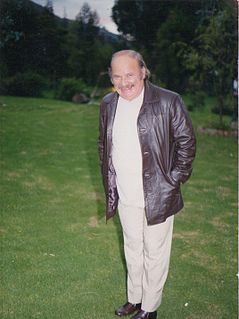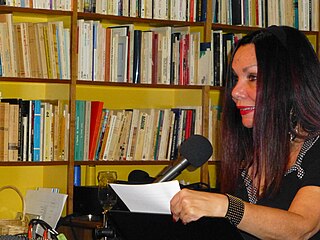
Jorge Majfud is a Uruguayan American writer.

Julio Ramón Ribeyro Zúñiga was a Peruvian writer best known for his short stories. He was also successful in other genres: novel, essay, theater, diary and aphorism. In the year of his death, he was awarded the US$100,000 Premio Juan Rulfo de literatura latinoamericana y del Caribe. His work has been translated into numerous languages, including English.

Francisco Ayala García-Duarte was a Spanish writer, the last representative of the Generation of '27.
Roberto Laserna is a Bolivian and Spanish writer and economist who earned a PhD from the University of California, Berkeley in regional planning.

Diamela Eltit is a Chilean writer and university professor. She is a recipient of the National Prize for Literature.

Antonio Cornejo-Polar was a Peruvian-born academic, teacher, literature and cultural critic, known particularly for his theorization of the concept of "heterogeneity."
Consuelo Hernández is a Colombian American poet, scholar, literary critic and Associate Professor of Latin American studies at American University since 1995.

Fermín Toro y Blanco was a Venezuelan humanist, politician, diplomat and author.

José María Balbino Venancio Samper Agudelo was a Colombian lawyer, politician, and writer. In his writing he covered many genres including poetry, drama, comedy, novels, didactic works, biographies, travel books, and critical and historical essays. He collaborated in different periodicals of his time, was founder of La Revista Americana, and worked as managing editor of El Deber, and editor-in-chief of El Comercio.

Hernando Casanova Escobar known as El Culebro Casanova, was an Colombian actor, director, singer, and presenter. He is considered one of the precursors of comedy and one of the most important actors in the history of Colombia. His versatility as an actor led him to become one of the greatest icons of acting in Colombia. He was considered during a gap his career as the best actor in Colombia. In a career spanning over four decades, he received multiple recognitions for his artistic achievements, including a nomination as a 'revelation actor' at the Ondra Awards in Spain and an award for 'best dramatic actor' at the APE.

Vivir a Destiempo is a Mexican telenovela produced by Fides Velasco and Jacky Castro for Azteca. It stars Edith González and Ramiro Fumazoni as the protagonists alongside Humberto Zurita, Andrea Noli and Wendy de los Cobos as the main villains. The original story and screenplay is written by Eric Vonn. From February 25 to September 20, 2013, Azteca 13 broadcast Vivir a Destiempo, replacing Los Rey.

Reina Roffé is an Argentine writer. She was born in Buenos Aires. She studied journalism and literature at university. Her first novel, Llamado al Puf, won the Premio Pondal Ríos for the best work by a young author in 1973. For La rompiente, she received the Premio Internacional de Novela Breve awarded by the Municipality of San Francisco, Córdoba.

Alberto Chimal is a Mexican writer. He also coordinates and teaches literary workshops, and is an authority on the subject of literature on the Internet and digital writing.

Marta Lynch was the pseudonym of Marta Lía Frigerio, an Argentinian writer. She wrote seven novels and nine collections of short prose.

El fiscal is a 2015 detective fiction novel from Argentina, freely based on the death of Alberto Nisman.

Tanto amor, is a Mexican telenovela produced by Rita Fusaro for El Trece. It is a remake of the Argentine telenovela Pasiones produced in 1988.

La Reina de América is a novel by Uruguayan author Jorge Majfud. It was published by Baile del Sol in 2002.

Gloria Macher is a Peruvian-Canadian writer living in Montreal. Her work explores social, political, ecological and existential themes. She is considered a main proponent of the contemporary humanistic literary scene.

Chely Lima is a queer Cuban American writer of novels, poetry, and plays, as well as a photographer, editor, and screenwriter.
1. Taiano, Leonor, "Huyendo hacia la paradoja del tío Sam: Consideraciones sobre Crisis de Jorge Majfud", Finisterre: en el último lugar del mundo, Destiempos, 2017, pp. 123–148.
2. García-Teresa, Alberto. "Crisis", Revista Viento Sur, no. 126. January 2013 p. 127.

















